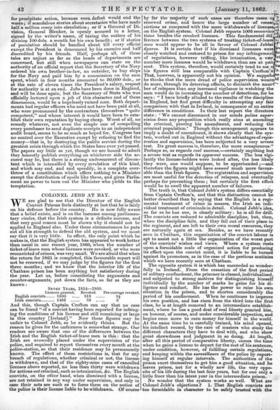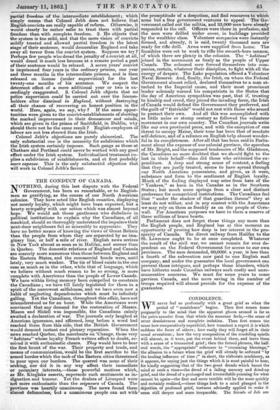COLONEL JEBB AT BAY.
WE are glad to see that the Director of the English Convict Prisons feels distinctly at last that he is fairly on his defence before the country. He is now fully aware that a belief exists, and is on the increase among parliamen- tary circles, that the Irish system is a definite success, and that very good reason must be shown why it should not be applied to England also. Under these circumstances he puts out all his strength to defend the old system, and we must say that it is very little. In effect, the only point which he makes is, that the English system has appeared to work better than usual in one recent year, 1860, when the number of ticket-of-leave men whose licenses were revoked, or who were reconvicted of crimes, was very small. We are afraid that when the return for 1861 is completed, this favourable report will not be renewed, if we may judge by the figures for the first three months ; and we know that the interior life of the Chatham prison has been anything but satisfactory during the year. Let us, before considering the arguments and counter-arguments, put down the facts, so far as they are known : SzvmsT YEARS, 1854-1860.
Licenses granted. Revoked. Per-centage revoked..
English convicts 8500 ..... 818 8i Irish convicts 1462 89 6 And this, though Captain Crofton can say that no case can be found "of a convict having been reported for infring- ing the conditions of his license and still remaining at large in this country [Ireland]." Now these figures may be unfair to Colonel Jebb, as he evidently thinks. But the reason he gives for the unfairness is somewhat strange. Our readers are aware that one of the differences between the Irish and the English ticket-of-leave men is this : that the Irish are avowedly placed under the supervision of the police, and required to report themselves every month at the police-station, so that their residence may be permanently known. The effect of these restrictions is, that for any breach of regulations, whether criminal or not, the license is withdrawn, and that of the eighty-nine cases of cancelled licenses above reported, no less than thirty were withdrawn for actions not criminal, such as intoxication, Szc. The English convicts, on the other band, when dismissed with a license, are not retained in any way under supervision, and only in case their acts are such as to force them on the notice of the police is their license liable to be withdrawn. Of course by far the majority of such cases are therefore cases oIf.k. renewed crime, and hence the large number of recoset4, victions as compared with the mere withdrawals of licenses.pd. on the English system. Colonel Jebb reports 1005 reconviceil tions besides the revoked licenses. This fundamental dif .0€.1 ference between the two systems of treating ticket-of-leave men would appear to be all in favour of Colonel Jebbsi figure:. It is certain that if his dismissed licensees weis closely watched and restored to prison for any infringemeic of regulations, however trifling, like intoxication, a van number more licenses would be withdrawn than are at pair sent. This system, therefore, would certainly tend to ma o his figures still less comparable with Captain Crofton's" That, however, is apparently not his opinion. We suppoh he thinks that the mere dread of police supervision wouonld do more, through its deterring effects, to diminish the nturpr- ber of relapses than any increased vigilance in watching the men would do in increasing the number of detections, for he says: "I have briefly alluded to the results of the discipline in England, but find great difficulty in attempting any fair comparison with that in Ireland, in consequence of an entire difference in conditions. In their last report the directors state : 'We cannot disconnect in our minds police super- vision from any proposition which really aims at amending the criminal, proving his amendment, and reducing the criminal population.' Though this arrangement appears to imply a doubt of amendment, it shows clearly that the sys- tem, worked out in England without the advantages of regis- tration and supervision, has been subjected to a very severe test. Its great success is, therefore, the more conspicuous." Perhaps so, as regards real success,—certainly anything but a severe test as regards its apparent success. The less vigi- lantly the license-holders were looked after, the less likely they were, one would suppose, to be apprehended ;—and therefore the figures might have seemed much more favour- able than the Irish figures. The registration and supervision are most useful for the detection of relapses, and eventually perhaps for preventing them ; but certainly the first effect would be to swell the apparent number of failures. The truth is, that Colonel Jebb's system differs essentially from Captain Crofton's, and that this distinction cannot be better described than by saying that the English is a regi- mental treatment of crime in masses, the Irish an indi- vidual treatment of criminals in detail. Colonel Jebb's idea, so far as be has one, is clearly military: he is all for drill. The convicts are reduced to admirable discipline but, then, when the discipline fails, and they fall out of their place in the regiment, and are left to their own moral resources, they are naturally again at sea. Besides, as we have recently seen in Chatham, this organization of the convict labour is apt to assist not a little the organization of the worst part of the convicts' wishes and views. Where a system rests upon a formidable scale of organized action for producing its effect upon the convict mind, it is liable to be turned against its promoters, as in the case of the perilous mutinies which we have recently seen at Chatham. ' The opposite system it is which has succeeded so wonder- fully in Ireland. From the cessation of the first period of solitary confinement, the prisoner is classed, individualized, and subjected to strong motives for distinguishing himself individually by the number of marks he gains for his di- ligence and conduct. He has the power to raise his own situation in the prison, and to shorten considerably the period of his confinement. When he continues to improve his own position, and has risen from the third into the first class, he is at length removed to an intermediate establish- ment, where be has a good deal of real liberty granted him, on honour, of course, and under considerable inspection, and begins once more to earn money for himself in the world. At the same time he is carefully trained, his mind opened, his intellect roused, by the care of masters who study the different characters they have to deal with, and who show great shrewdness and judgment in so doing. At length, after all this period of comparative liberty, comes the time when he gains a license to depart for the rest of his sentence, under condition, however, of fulfilling certain regulations, and keeping within the surveillance of the police by report- ing himself at regular intervals. The authorities of the prison exert themselves to get him a good situation, and he leaves prison, not for a wholly new life, the very oppo- site of his life during the last four years, but for one only a little freer than his latest year in the intermediate prison. No wonder that the system works so well. What are Colonel Jebb's objections 2 1. That English convicts are too formidable in character to be safely trusted with the ke s. se partial freedom of the intermediate establishment ; which simply means that Colonel Jebb does not believe that English convicts are really capable of reform. Otherwise, it would clearly be rather safer to trust them with partial freedom than with complete freedom. 2. He objects that the system is too mild, and that the mere vision of convicts mildly treated and allowed partial freedom in the latest stage of their sentence, would demoralize England and take away all terror from the convict system. Suppose we try ? Perhaps few people who dread the penalty of a convict at all, would dread it much less because at a remote period a part of their sentence would be relaxed. A seven years' convict is imprisoned four years in the ordinary prisons, one year and three months in the intermediate prisons, and is then released on license (under supervision) for the last twenty-one months of his sentence. We suspect the deterrent effect of a mere additional year or two is ex- ceedingly exaggerated. 3. Colonel Jebb objects that no police supervision could be carried out over the license- holders after dismissal in England, without destroying all their chance of recovering an honest position in the world. Here, again, we say, why ? If the same oppor- tunities were given to the convict-establishments of showing the marked improvement in their demeanour and minds, which are given in the prison of Smithfield, in Dublin, why should there not be the same result ? English employers of labour are not less shrewd than the Irish.
Colonel Jebb's objections are purely chimerical. The only substantial one is the necessity for subdivision which the Irish system certainly imposes. Such gangs as those at Chatham and Portland could never be worked with any good effect under the Irish system. Individualized treatment im- plies a subdivision of establishments, and at first probably more expense. This is the only substantial objection that will work in Colonel Jebb's favour.































 Previous page
Previous page